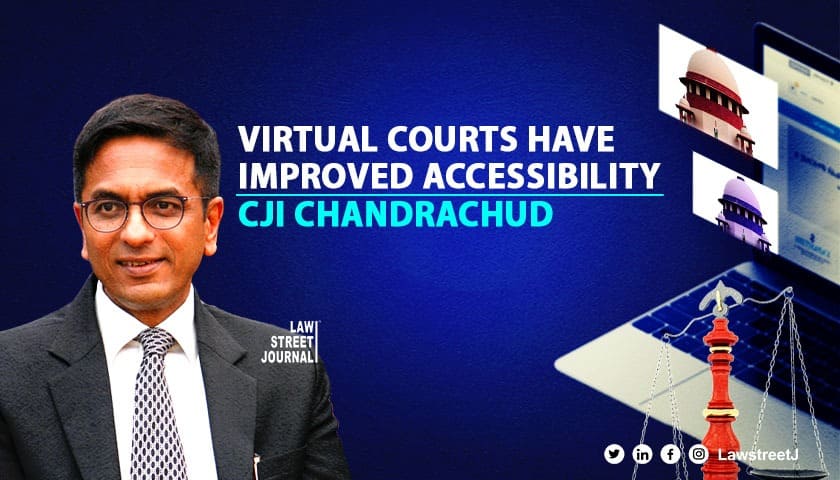NEW DELHI: The Chief Justice of India DY Chandrachud on Sunday said the virtual courts initiative has been a game changer with regard to courtroom access and online dispute resolution.
"Implemented in 20 States, the initiative has received 4.37 Crore Challans, leading to a total collection of Rs 502.25 Crores in fines. Interestingly, according to the electronic transaction analyser of the Government of India, in 2018, e-courts had surpassed even the Indian railways in terms of total electronic transactions, the CJI elaborated while speaking on the occasion on 75th year of the foundation of the Supreme Court.
Talking about the administrative side, the Supreme Court has been identifying and eliminating as many barriers to justice unequal access to legal resources, unfamiliarity of the English language, issues of physical accessibility of courts in order to create procedural fairness, he said.
Highlighting about various projects, Justice Chandrachud said nearly 1,28,000 e-filing has been done since launch of upgraded version in May, 2023.
"E-filings are available in 25 states. They have recorded over 29 Lakh case filings. With the immense support of the Bar and the Bench, we were able to swiftly shift to virtual hearings during COVID-19," he said, adding even after the pandemic, hybrid hearings continue to be a feature of courts, allowing any Indian lawyer sitting in any part of the country, or the world to argue before this court.
He said more than 13 lakh legacy and live case records with approximately 10 crore pages have been digitized.
About other measures, he said the Supreme Court has enabled Futuristic Court Technology in three courtrooms and soon other Court rooms shall be equipped with such technology, which facilitated paperless proceedings, a comprehensive digital library for the Bench and the Advocates, state-of-the art video conferencing, large video walls, smart monitors and document visualizers, all of which redefine the courtroom experience.
In the future, he said the Supreme Court is soon going to migrate its digital data to a safe, secure and sovereign cloud, which would be a shot in the arm for the IT setup of the Court. Cloud storage would ensure privacy, integrity, high availability, and secure accessibility of Supreme Courts domain data, he said.
"We are also on the verge of opening a War Room equipped with technology that would enable the Supreme Court to monitor judicial data of the entire country in real time by using National Judicial Data Grid (NJDG) and iJuris, both of which are information sharing platforms for the district judiciary. iJuris has been launched by the Supreme Court to monitor statistics of vacancies and infrastructure relating to the district judiciary," he said.
The CJI said the Supreme Court was established with a sense of idealism that laws would be interpreted by a Constitutional Court in accordance with the rule of law and not by colonial values or social hierarchies. It affirmed the belief that the judiciary should serve as a bulwark against injustice, tyranny, and the arbitrariness.
"The Supreme Court is an institution of resolution and justice. The fact that people approach it in large numbers, speaks to how far we have succeeded in discharging that role," he said.
Justice Chandrachud said the day is not only a celebration of that one day when the Supreme Court came into being as it also is a celebration of the decades worth of hard work by succeeding generations of judges and lawyers that went into making this a peoples court.

















